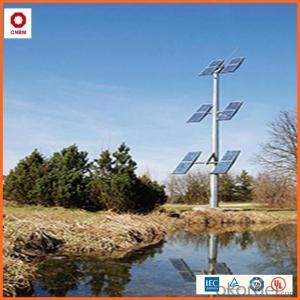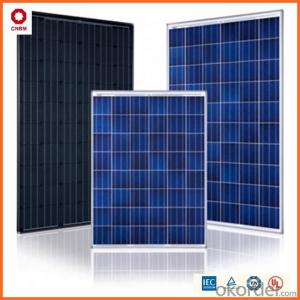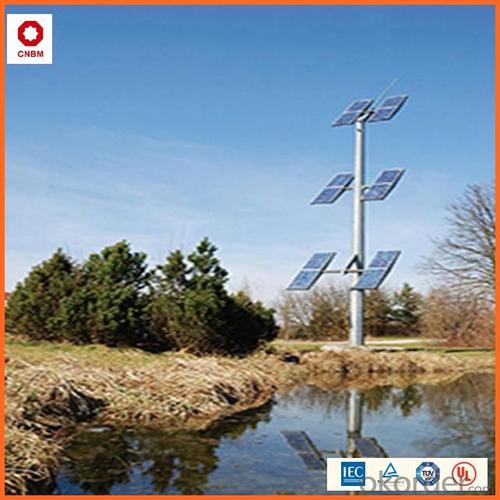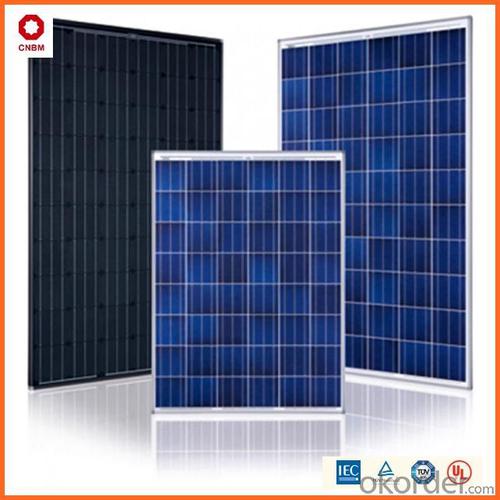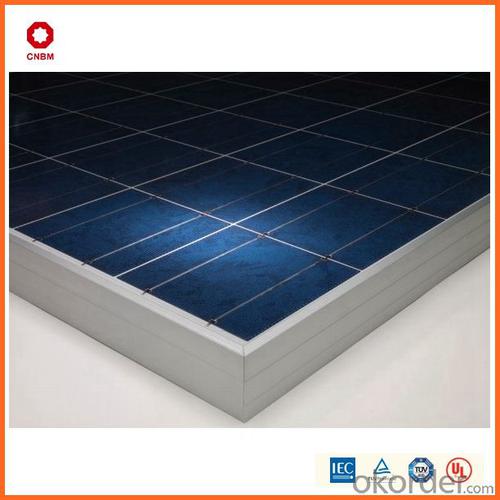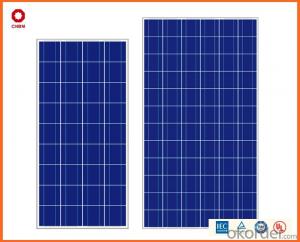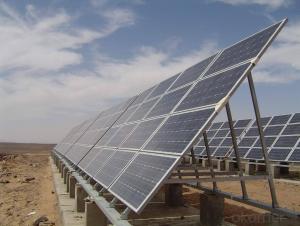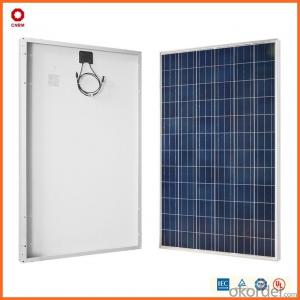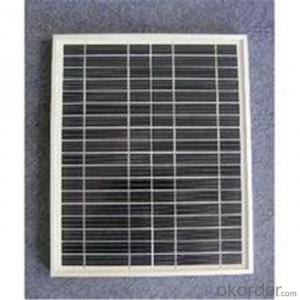Solar Energy Systems Rochester - Stock Small Solar Panel 50W Poly with Good Quality - Hot on Sale
- Loading Port:
- China main port
- Payment Terms:
- TT OR LC
- Min Order Qty:
- 1 watt
- Supply Capability:
- 10000000 watt/month
OKorder Service Pledge
OKorder Financial Service
You Might Also Like
Product Description:
Hot Sale !!! Quality and Safety of Small Poly Solar Panel 35~85w
1. Rigorous quality control meets the highest international standards.
2. High-transmissivity low-iron tempered glass, strong aluminium frame.
3. Using UV-resistant silicon.
4. IS09001/14001/CE/TUV/UL
Warranties of Small Poly Solar Panel 35~85w
1. 10 years limited product warranty
2. 15 years at 90% of the minimal rated power output
3. 25 years at 80% of the minimal rated power output
Technical date of 45w-85w Poly Solar Panel
ITEM NO.: | Mono 125*125 cell ,36pcs . Power range from 80Wp-100Wp | ||||||||
Maximum Power(W) | 80 | 85 | 90 | 95 | 100 | ||||
Optimum Power Voltage(Vmp) | 17.81 | 17.89 | 17.94 | 17.99 | 18.06 | ||||
Optimum Operatige Current(Imp) | 4.78 | 4.91 | 5.12 | 5.35 | 5.59 | ||||
Open Circuit Voltage(Voc) | 21.98 | 22.05 | 22.14 | 22.28 | 22.45 | ||||
Short Circuit Current(Isc) | 4.95 | 5.15 | 5.36 | 5.65 | 5.84 | ||||
Solar Cell: | 125*125 Mono | ||||||||
Number of Cell(pcs) | 4*9 | ||||||||
Brand Name of Solar Cells | JA Cell, Bluesun Cell | ||||||||
Size of Module(mm) | 1580*808*35 | ||||||||
Caple & Connector Type | Pass the TUV Certificate | ||||||||
Frame(Material Corners,etc.) | Aluminium-alloy | ||||||||
Backing (Brand Type) | TPT | ||||||||
Cell Efficiency for 100W(%) | 15.8% | ||||||||
Weight Per Piece(KG) | 12.0KG | ||||||||
FF (%) | 70-76% | ||||||||
Junction Box Type | Pass the TUV Certificate | ||||||||
Tolerance Wattage(e.g.+/-5%) | ±3%, or 0-3% | ||||||||
Front Glass Thikness(mm) | 3.2 | ||||||||
Temperature Coefficients of Isc(%) | +0.04 | ||||||||
Temperature Coefficients of Voc(%) | -0.38 | ||||||||
Temperature Coefficients of Pm(%) | -0.47 | ||||||||
Temperature Coefficients of Im(%) | +0.04 | ||||||||
Temperature Coefficients of Vm(%) | -0.38 | ||||||||
Temperature Range | -40°C to +85°C | ||||||||
Surface Maximum Load Capacity | 2400Pa | ||||||||
Allowable Hail Load | 23m/s ,7.53g | ||||||||
Bypass Diode Rating(A) | 12 | ||||||||
Warranty | 90% of 10 years,80% of 25 years. | ||||||||
Standard Test Conditions | AM1.5 1000W/ 25 +/-2°C | ||||||||
Packing | carton or pallet | ||||||||
1*20' | 25 Pallets / 450pcs | ||||||||
1*40'STD | 25 Pallets / 100pcs | ||||||||
Features of our products:
• High conversion efficiency mono/poly-crystalline amorphous silicon solar cells
• Modules incorporate high performance bypass diodes to minimize the power drop caused by shading
• High transmittance, low-iron tempered glass
• High performance EVA encapsulant to prevent destroying and water.
• AI frame: without screw, corner connection. 8 holes on the frame can be installed easily
• Good performance of preventing from atrocious weather such as wind and hails
• Certifications: CE IEC TUV VDE UL, Class I
• 10 years 90% power output warranty

Shipping of Small Poly Solar Panel 35~85w
By Sea | Delivery from Shanghai or Ningbo seaport |
By Air | Departure from Shanghai Pudong Airport |
By Express | Post by DHL, EMS, UPS, TNT. |
- Q: How does solar energy work?
- Solar energy works by harnessing the power of the sun's rays and converting them into usable electricity. This process involves the use of solar panels, which contain photovoltaic cells that absorb sunlight and release electrons, creating an electric current. The generated electricity can then be used to power various devices or stored in batteries for later use.
- Q: What is the role of grounding systems in a solar energy system?
- The role of grounding systems in a solar energy system is to ensure safety and protect the system and its users from electrical faults and lightning strikes. Grounding refers to the connection of electrical equipment and components to the Earth's surface, creating a low-impedance path for electrical faults to flow, thus preventing the buildup of excessive voltages that could pose a risk to people and equipment. In a solar energy system, grounding serves several important purposes. Firstly, it provides protection against electrical shock by redirecting any fault currents into the ground, minimizing the potential for injury. This is crucial as solar panels and inverters are exposed to sunlight and could be touched by people during maintenance or repairs. Secondly, grounding helps to dissipate static electricity that might accumulate in the system, particularly in panels and mounting structures. Static electricity can cause damage to sensitive electronics and may even lead to fires or explosions if not properly controlled. By grounding these components, any static charges are safely discharged into the ground. Moreover, grounding systems play a vital role in safeguarding the solar energy system against lightning strikes. Lightning carries enormous amounts of electrical energy, and without proper grounding, it can cause severe damage to the system. By providing a low-resistance path for lightning to follow, grounding systems channel the electrical energy safely into the ground, protecting the solar panels, inverters, and other equipment from damage. Lastly, grounding systems help to maintain a stable electrical reference point for the system. This is important for accurate monitoring, control, and efficient operation of the solar energy system. Grounding helps to minimize electromagnetic interference (EMI) and noise that can affect the performance of sensitive electronic components, ensuring optimal functioning of the system. In summary, the role of grounding systems in a solar energy system is to ensure safety by protecting against electrical shocks, dissipating static electricity, and safeguarding against lightning strikes. Additionally, grounding systems maintain a stable electrical reference point, promoting efficient operation and reducing the risk of equipment damage.
- Q: How do solar energy systems impact job creation?
- Solar energy systems have a positive impact on job creation as they require skilled professionals for installation, maintenance, and operation. This industry's growth has led to the creation of various job opportunities, particularly in manufacturing, engineering, construction, and project management. Additionally, the widespread adoption of solar energy stimulates local economies, attracting investments and driving the need for more skilled workers, contributing to overall job creation.
- Q: How do solar energy systems affect the environment?
- The environment benefits greatly from solar energy systems, which have a significantly positive impact. These systems provide a renewable and clean source of energy, meaning they don't emit harmful substances or contribute to air pollution. This effectively reduces greenhouse gas emissions and helps combat climate change. In addition, solar energy systems don't require water for operation, unlike traditional fossil fuel power plants. This helps alleviate water scarcity issues in certain areas. Moreover, solar energy systems have a minimal effect on land use. One can install rooftop solar panels on existing structures, maximizing space utilization and minimizing the need for extra land. Solar farms can also be built on marginal or unused land without disrupting natural habitats or valuable ecosystems. Furthermore, solar energy systems positively affect human health. By reducing air pollution and emissions from conventional energy sources, they improve air quality, resulting in fewer respiratory and cardiovascular diseases. Consequently, this lowers healthcare costs and enhances overall well-being. Additionally, solar energy systems offer the advantage of job creation and economic growth. The installation, maintenance, and manufacturing of solar panels require a skilled workforce, leading to the creation of new employment opportunities. Furthermore, investing in solar energy infrastructure helps diversify the energy sector, reducing reliance on imported fuels and enhancing energy security. While solar energy systems bring numerous environmental benefits, it is important to consider potential challenges. The production and disposal of solar panels may have some environmental impact due to the use of certain materials during manufacturing. However, ongoing technological advancements and recycling programs continuously address these concerns. In conclusion, solar energy systems positively influence the environment by reducing greenhouse gas emissions, minimizing air and water pollution, conserving land resources, improving human health, and stimulating economic growth. As we transition towards a more sustainable future, solar energy will play a crucial role in mitigating climate change and protecting the environment.
- Q: How does the efficiency of solar panels vary across different climates?
- The efficiency of solar panels can vary across different climates due to several factors. In regions with abundant sunlight and minimal cloud cover, such as deserts, solar panels tend to perform at their highest efficiency. The panels can convert a larger percentage of sunlight into electricity, resulting in higher energy output. However, in climates with frequent cloud cover, rain, or lower sunlight intensity, the efficiency of solar panels may decrease. These factors can reduce the amount of sunlight reaching the panels, thereby reducing their energy conversion rate. Additionally, extreme temperatures in certain climates can negatively impact the performance of solar panels. Overall, solar panel efficiency is influenced by the amount and intensity of sunlight available in a particular climate.
- Q: Can solar energy systems be used in areas with limited grid infrastructure?
- Yes, solar energy systems can be used in areas with limited grid infrastructure. Solar energy systems are particularly suitable for off-grid or remote areas where it may be challenging or costly to extend the existing electrical grid. These systems can provide a reliable and sustainable source of electricity, reducing dependence on traditional grid infrastructure and fossil fuels.
- Q: Can solar energy systems be used in powering fire stations or police stations?
- Yes, solar energy systems can certainly be used to power fire stations or police stations. Solar panels can be installed on the rooftops of these buildings to harness sunlight and convert it into electricity. This renewable energy source can help reduce the reliance on traditional power grids and lower operational costs for these facilities. Additionally, solar energy systems can ensure a more sustainable and environmentally friendly power source for fire and police stations.
- Q: Can solar energy systems be used in areas with limited access to educational resources?
- Yes, solar energy systems can be used in areas with limited access to educational resources. Solar energy systems are relatively simple to install and operate, requiring minimal technical knowledge. With basic training and guidance, local communities can learn to set up and maintain solar systems, even in areas with limited educational resources. Additionally, there are numerous online resources and organizations that provide educational materials and support for individuals and communities interested in harnessing solar energy. Thus, solar energy systems can be a viable and sustainable solution for areas with limited access to educational resources.
- Q: Are solar energy systems noisy?
- No, solar energy systems are not noisy. They do not produce any sound while generating electricity from sunlight.
- Q: Can solar energy systems be used for commercial or industrial purposes?
- Yes, solar energy systems can definitely be used for commercial or industrial purposes. Many businesses and industries are increasingly adopting solar power as a sustainable and cost-effective alternative to traditional energy sources. Solar panels can be installed on rooftops, parking lots, or open spaces to generate electricity for powering offices, factories, warehouses, and other commercial or industrial facilities. Additionally, solar energy systems can help businesses reduce their carbon footprint and save on energy costs in the long run.
Send your message to us
Solar Energy Systems Rochester - Stock Small Solar Panel 50W Poly with Good Quality - Hot on Sale
- Loading Port:
- China main port
- Payment Terms:
- TT OR LC
- Min Order Qty:
- 1 watt
- Supply Capability:
- 10000000 watt/month
OKorder Service Pledge
OKorder Financial Service
Similar products
Hot products
Hot Searches
Related keywords
